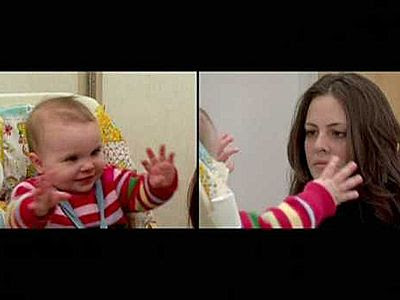
I love this clip of the twin boys at nap time. As soon as I saw it I knew it would have to go into my lectures for my Ed Psych class, but I couldn't decide where.
Do I include it in moral development because climbing out of the crib did not warrant an "uh-oh" until mom walked into the room?
Do I include it in modeling because one twin learns enactively and the other vicariously?
Do I include it in problem solving noting that the brave twin re-thinks and finds a way to keep his actions secret?
I finally settled on motivation because one twin sees naptime as his fate and the other refuses the inevitable. My question to the class will be: "Which twin would you rather have in class, the one who is obedient, or the one who can think outside the crib?
I will let the students mull over that one for a while.
It is interesting how the twins understood the camera meant they were being watched. Of course, they don't realize, yet, that mom has other ways of knowing what is happening in the nap room. They might still be at the stage where they think if they cover their own eyes no one can see them. They certainly don't like to be watched.
O God, You know my folly; the wrongs I have done are not hidden from You. Psalm 69:5
My mother-in-law does not like to be watched, either. Her current cognitive abilities make it wise that she be checked-in on from time to time. I see her when I set up her meds, my daughter stops in when she goes to the studio to work and now the in-home aide assigned to clean her house needs to check on hygiene and eating habits. Understandably, Dorris expresses frustration with this series of events. Still, we do it, because we know it is what is best for her. Even though she doesn't like it, she probably understands that it is better than the alternative which requires moving to a place that can maintain constant supervision.
From when we are babies, until we are elderly, we require some level of supervision, for play, for work, for life skills. We don't generally like it; we usually accept it.
You know when I sit down and when I rise; You discern my thoughts from afar. Psalm 139:2
The Bible has 887 verses that include the word "know." Both reminders of what God knows about us and what He chooses to let us know about Him. The Bible contains everything we can know about God, this side of heaven. Even if we read it continuously, we will still only know an infinitesimal amount. And we can't know that without God making it possible.
God, however, knows everything about us. Because we grow up in a world that values "privacy" and because we know we have a lot to hide, this causes us much consternation. We want to move the camera, and hide our words, thoughts and actions from a God who is perfect.
It is better, I think, to contemplate the up-side to an omniscient God. He knows our faults; this is true. But, He also knows our sorrows, our joys and our needs. We may not like nap time, but it sure is nice to have someone who knows we would like some milk and a cookie when we wake up.
My God knows me and loves me in spite of that. My God knows me and provides for me before I even know I need it. My God knows me and knows His plans for me. My God knows me and died and rose again to take a way my sins, even before I was born.
Our God knows.
Be still, and know that I am God. Psalm 46:10











